Always Tired: Understanding the Possible Causes Beyond Sleep
Zoey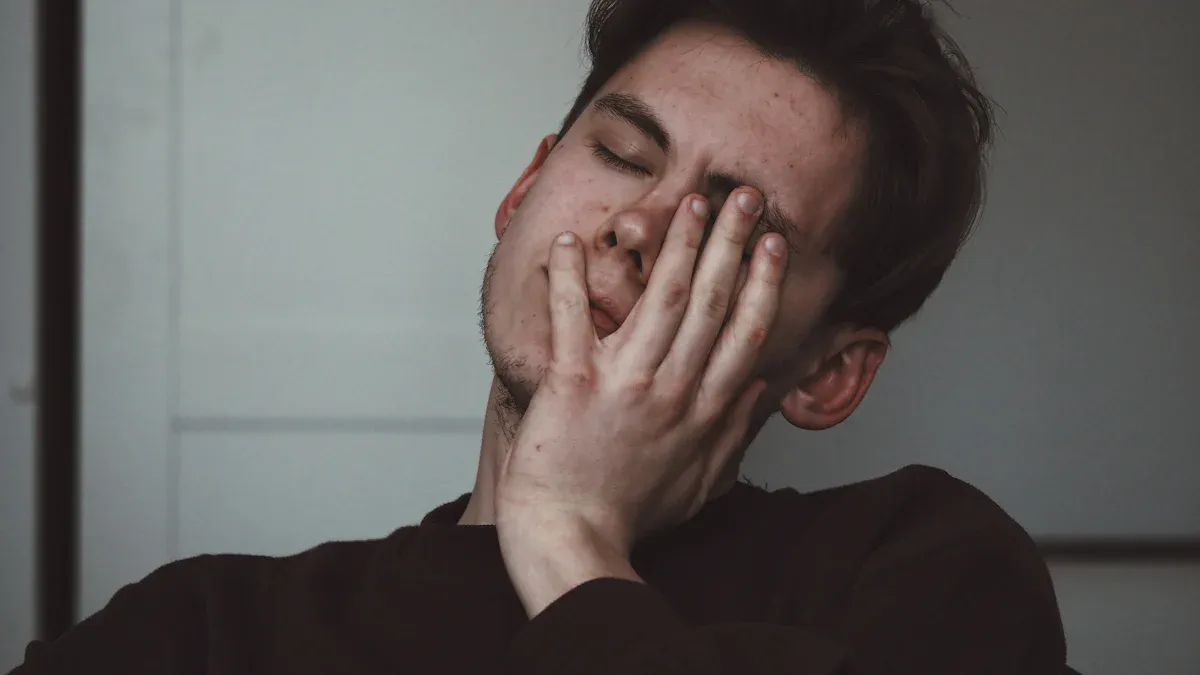
If you are always tired even after sleeping well, you are not alone. Many people experience feeling very tired despite getting a good night's rest. Nearly 60% of adults who sleep 8–10 hours still feel tired during the day.
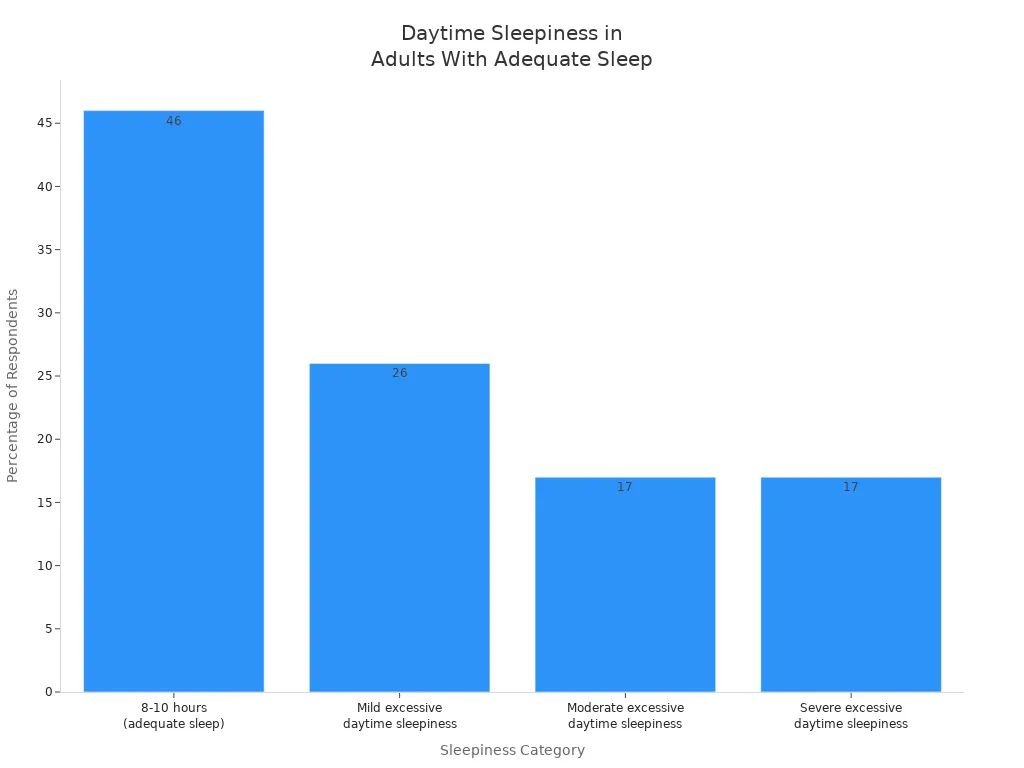
Fatigue can occur for many reasons. Your health, emotions, and habits all play a role. Not getting enough sleep is just one factor. Other causes of being always tired are often overlooked. If feeling tired makes your day difficult, it’s important to explore other possible reasons.
Key Takeaways
Always feeling tired can have many causes besides not sleeping enough. These causes include health problems, mental health, how you live, and what you eat. Medical issues like anemia, thyroid problems, chronic fatigue syndrome, and POTS can make you tired all the time. You need a doctor to find out if you have these problems. Stress, anxiety, and depression can use up your energy and hurt your sleep. This can make you feel tired even after you rest. Daily habits like eating poorly, not drinking enough water, not moving enough, or doing too much can make you more tired. If you feel tired for more than a week or have other symptoms, see a doctor. The doctor can help find out why you are tired and give you the right treatment.
Common Causes of Fatigue
There are many reasons you might feel tired besides sleep. Knowing these reasons can help you fix the problem. Most causes fit into four groups: medical, mental health, lifestyle, and diet or hydration.
Medical Causes
Lots of health problems can make you tired. Some affect your blood, heart, or lungs. Others involve your immune system or hormones. Here are some common medical causes:
Heart and lung problems like asthma, pneumonia, or heart disease can lower oxygen in your body. This can make you feel tired.
Conditions like anemia, high blood pressure, fibromyalgia, lupus, rheumatoid arthritis, and infections such as flu or hepatitis often cause tiredness.
Endocrine and metabolic disorders, like diabetes and thyroid issues, can change your energy.
Some medicines, like antidepressants or antihistamines, can make you tired as a side effect.
Chronic pain or being very underweight or overweight can also cause tiredness.
Medical Condition Category |
Examples and Notes |
|---|---|
Overlapping Conditions |
Fibromyalgia, irritable bowel syndrome, sleep disorders |
Autoimmune Diseases |
Lupus, Hashimoto's thyroiditis, multiple sclerosis, rheumatoid arthritis |
Infectious Diseases |
Lyme disease, HIV/AIDS, mononucleosis |
Endocrine Disorders |
Addison disease, thyroid dysfunction |
Sleep Disorders |
Obstructive sleep apnea, restless legs syndrome |
Psychiatric Disorders and Substance Abuse |
Psychiatric conditions, alcohol or drug abuse, medication side effects |
Mental Health Causes
Your feelings and thoughts can affect your energy. Stress, anxiety, and depression are common reasons for feeling tired. Emotional exhaustion, trauma, and burnout can also make you feel worn out. If you have trouble sleeping, your mental health can get worse and make you more tired.
Lifestyle Causes
What you do every day matters a lot. Not moving enough or moving too much can make you tired. Using alcohol or drugs can lower your energy. Even caffeine can mess up your sleep and make you more tired later. Not sleeping enough or sleeping poorly often leads to feeling tired all the time.
Diet and Hydration
What you eat and drink is important. Eating poorly, not drinking enough water, or skipping meals can make you tired. If you do not get enough vitamins or minerals, your body may not have the energy it needs. Eating too much sugar or processed food can also make you feel tired.
Tip: If you are always tired, check all these areas. Small changes in your habits or diet can help a lot.
Medical Causes
If you are tired all the time, it might be a health problem. Some health issues can make you feel tired, weak, or low on energy. If you notice these signs a lot, you should see your doctor. Here are some main medical reasons for always feeling tired.
Anemia
Anemia means your blood does not carry enough oxygen. This can make you feel weak, tired, or out of breath. Many people who feel tired all the time have anemia, especially older people. One study found that 14% of older adults had clinical anemia, and 30% had subclinical anemia. People who felt more tired were more likely to have anemia. Women who can have children also have a high risk. About 10-20% of them have iron deficiency anemia. If you have anemia, you may notice:
Always feeling tired and weak
Pale skin
Trouble breathing
Feeling dizzy
Iron supplements can help people with iron deficiency anemia feel less tired and do better in physical activities.
Thyroid Disorders
Your thyroid helps control your body’s energy. If your thyroid is not working right, you may feel tired all the time. Hypothyroidism and Hashimoto thyroiditis are common thyroid problems that cause tiredness. Even if you take medicine for your thyroid, you might still feel tired. In one survey, 89% of people with treated hypothyroidism still felt very tired. Many people with thyroid problems say tiredness is their main problem. Other signs are:
Gaining or losing weight
Feeling cold
Dry skin
Losing hair
If you have these signs and feel tired all the time, ask your doctor to check your thyroid.
Chronic Fatigue Syndrome
Chronic fatigue syndrome (CFS) is a long-lasting illness that makes you very tired. Doctors use special rules to find out if you have CFS. The CDC Fukuda rules say you must have strong tiredness for at least six months and at least four other signs like bad sleep, muscle pain, or memory trouble. Doctors must make sure nothing else is causing your tiredness before saying you have CFS. Chronic fatigue syndrome can make daily life very hard. You might feel:
Very tired after small tasks
Trouble thinking clearly
Sleep that does not help you feel better
CFS is not rare, but doctors sometimes miss it because the signs look like other health problems.
POTS
POTS stands for Postural Orthostatic Tachycardia Syndrome. This problem affects your nerves and blood flow. When you stand up, your heart beats too fast and blood stays in your legs. You may feel dizzy, weak, or very tired. POTS is often confused with just being tired or having anxiety. Many people with chronic fatigue syndrome also have POTS. Studies show that between 27% and 70% of people with CFS have POTS.
Study (Year) |
ME/CFS Patients |
Percentage with POTS |
|---|---|---|
Stewart et al. (1999) |
25 |
70% |
Schondorf et al. (1999) |
75 |
40% |
Hoad et al. (2008) |
59 |
27% |
If you feel very tired, dizzy, or your heart races when you stand up, ask your doctor about POTS.
Other Health Conditions
Many other health problems can make you feel tired all the time. Some of the most common are:
Health Condition / Factor |
Link to Ongoing Fatigue |
|---|---|
Diabetes |
Changes in blood sugar, problems from diabetes, and medicine side effects can make you tired. |
Inflammation |
Ongoing inflammation and some medicines for inflammation can make you tired. |
Sleep Disorders |
Sleep apnea and other sleep problems can mess up your sleep and make you tired. |
Cardiovascular Disease |
Heart problems can lower your energy and make you feel tired. |
Mental Health Disorders |
Anxiety and depression can make you feel tired and weak. |
Note: If you are tired all the time, do not ignore it. Always talk to your doctor if you do not feel better. Being tired for a long time can mean something serious is wrong.
Lifestyle Factors
The things you do every day affect your energy. Many people feel tired because of their daily choices. Here are some lifestyle reasons that can make you feel worn out.
Physical Inactivity
Not moving enough can make you more tired. Sitting too long makes your muscles weak. Weak muscles make simple things harder to do. People who exercise often have more energy. They also have less muscle tiredness than people who do not exercise. People who do not move much feel sadder and sleep worse. This can make you even more tired.
Aspect |
Evidence Summary |
|---|---|
Muscle Fatigue Definition |
Muscle fatigue means your muscles get tired and work less well. It happens during exercise or daily things. Not moving makes it worse. |
Effect of Physical Inactivity |
Not moving leads to weaker muscles and less muscle. It also changes your body’s energy use and makes you get tired faster. |
Comparison of Active vs Inactive |
People who exercise a lot get less tired. They also use energy better when they do hard things. This is because they are more fit. |
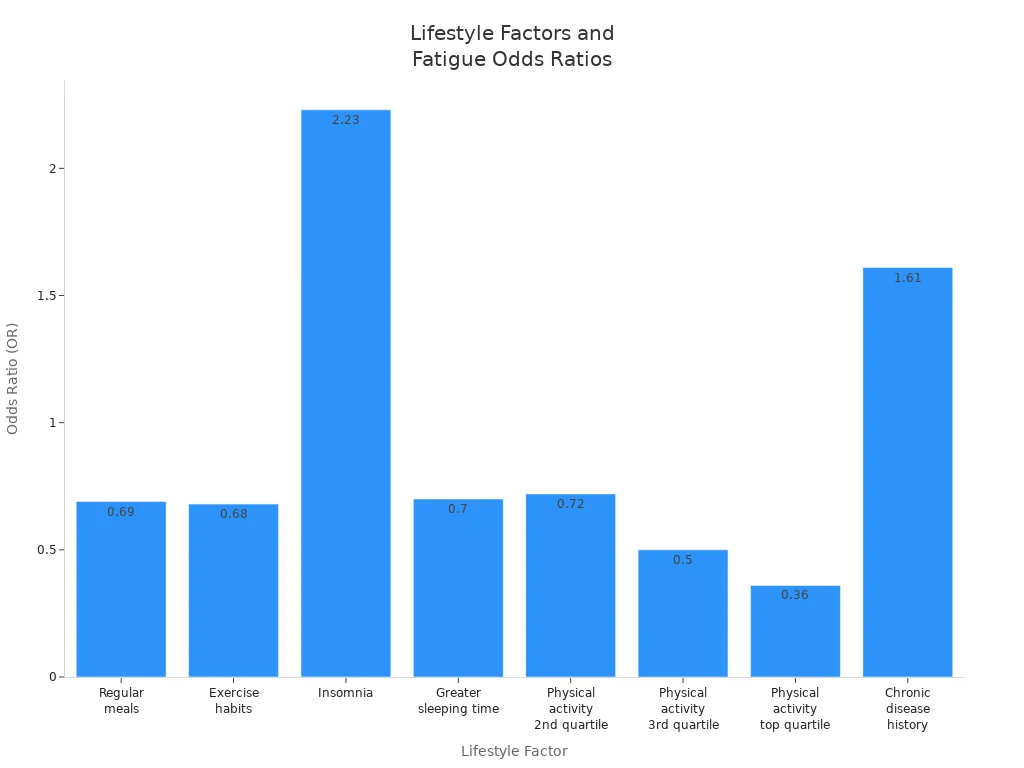
Overexertion
Doing too much can make you tired too. If you push yourself too hard, you may feel sore and weak. You might also feel grumpy. Overdoing it can mess up your sleep. It can also make you get sick more easily. You may notice:
Muscles hurt for a long time
You get sick more often
You feel tired even after sleep
Tip: Rest is important. Taking breaks helps your muscles heal and keeps your energy up.
Poor Diet
What you eat changes how you feel. Skipping meals or eating junk food is not good for you. Your body needs good food to have energy. Eating too much sugar or fat can mess up your sleep. It can also cause swelling in your body, which makes you feel worse.
Eating badly can make you too tired to cook or eat well. This can make you even more tired.
Dehydration
Your body needs water to work right. Not drinking enough water can make you tired. You might also feel dizzy or get headaches. Older people get dehydrated more easily. But anyone can feel tired from not drinking enough. Signs you need more water are dry mouth, confusion, and muscle cramps.
Substance Use
Alcohol, caffeine, and drugs can change your energy. Alcohol can make you sleepy at first. But later it can mess up your sleep. Caffeine can make you feel awake for a short time. But it can hide how tired you really are. Mixing alcohol with caffeine or drugs is dangerous. It can make you feel even more tired later. After using these things, your body needs time to feel better. This can make you tired for days or weeks.
Note: Small changes in your habits can help you feel more awake each day.
Mental Health and Emotional Causes
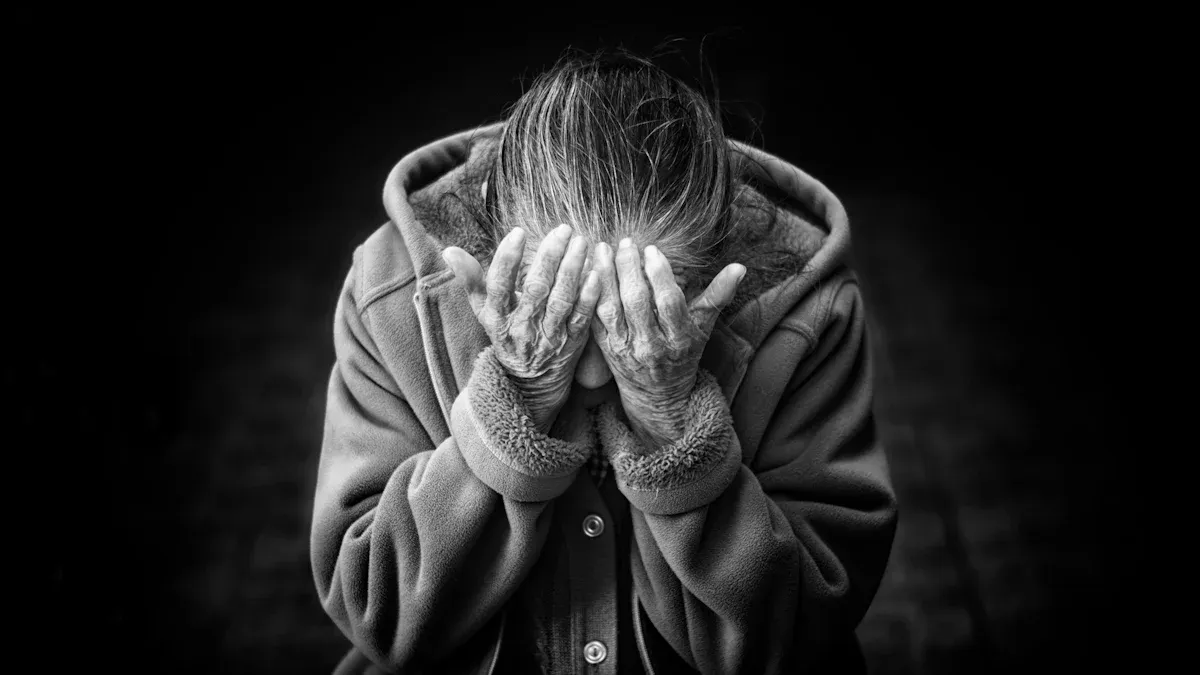
Mental health and emotions can play a big role in how much energy you have each day. When you feel overwhelmed or stressed, your body and mind can both become tired. These feelings can even make physical symptoms worse. Here are some common mental health causes of feeling tired all the time.
Stress
Stress happens when you feel pressure from school, work, or life changes. Your body reacts by releasing hormones like cortisol and epinephrine. These hormones raise your blood pressure and change how your body stores fat. Over time, chronic stress can change your sleep patterns and make you feel tired even after a full night’s rest. You might notice trouble sleeping, low energy, or even feeling sleepy during the day. Stress can also make you less active, which adds to the problem.
If you feel stressed for weeks, your body may not get a chance to recover. This can lead to ongoing tiredness and other health problems.
Anxiety
Anxiety makes you feel worried or nervous, sometimes for no clear reason. It can cause your heart to race and your muscles to tense up. Many people with anxiety also feel chronic fatigue. You may find it hard to relax or fall asleep. Anxiety can make you feel tired because your mind is always on high alert.
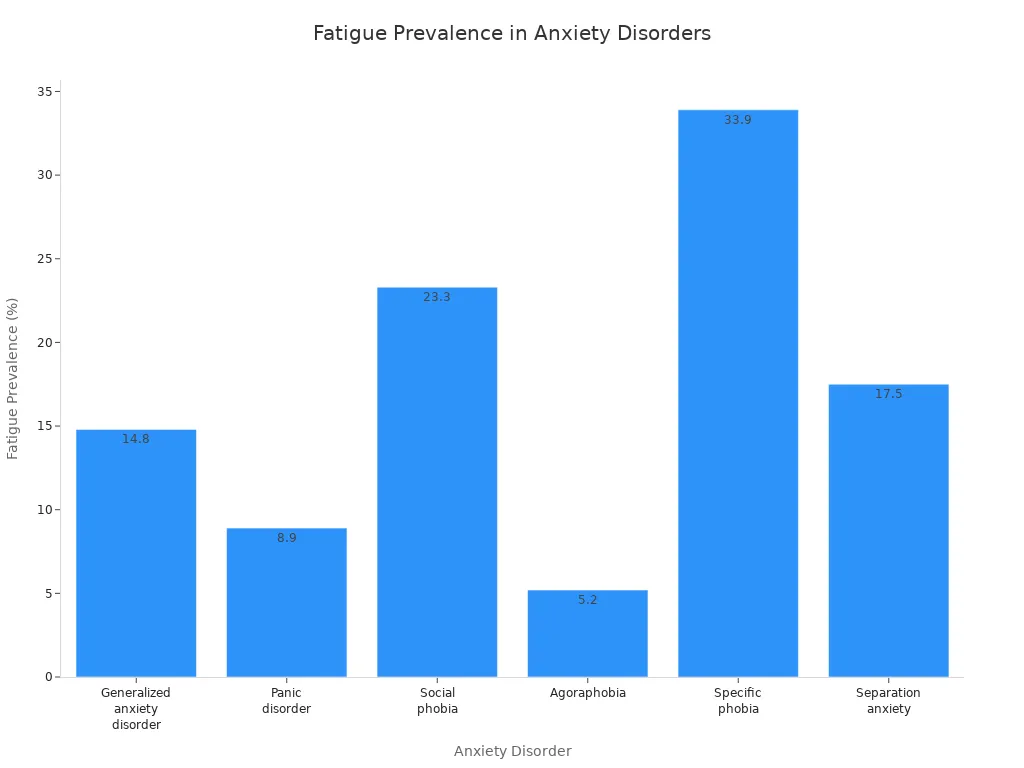
The chart above shows that many teens with anxiety disorders also report feeling tired for long periods. This tiredness can make it hard to focus or enjoy daily activities.
Depression
Depression is more than just feeling sad. It can make you feel heavy, slow, and tired all the time. You may have trouble getting out of bed or doing things you used to enjoy. Over 90% of people with depression report severe fatigue, even when they take medicine. Many people with depression notice physical symptoms like weakness, poor sleep, and low energy. Sometimes, tiredness is the main reason people seek help for depression.
Trauma
Trauma comes from very stressful or scary events. It can lead to post-traumatic stress disorder (PTSD) or other long-term problems. People with PTSD are much more likely to have chronic fatigue. Trauma can change how your brain and body handle stress. You may have trouble sleeping, feel jumpy, or get tired easily. After a serious illness or a big life event, you might notice these symptoms for months or even years.
Emotional overload and burnout can drain your mental energy.
When your mind feels exhausted, your body often feels the same way.
Mental and physical tiredness can make each other worse.
Remember, your brain needs time to recharge. Taking care of your mental health can help you feel more energetic.
What to Do If You’re Always Tired
Self-Care Steps
You can take many steps at home to help with ongoing fatigue. Start by focusing on self-care activities that support your body and mind. Try these strategies:
Eat healthy meals with fruits, vegetables, and whole grains.
Drink water often to prevent dehydration, which can cause tiredness.
Take short naps (20–30 minutes) early in the afternoon to boost energy without hurting your sleep at night.
Spend time on hobbies or activities you enjoy.
Practice spiritual or relaxing activities, like meditation or prayer.
Self-care helps protect you from compassion fatigue and can make a big difference in how you feel each day. Your beliefs about self-care matter, so remind yourself that taking care of your health is important.
When to See a Doctor
Sometimes, you need a doctor’s help to find the cause of your tiredness. You should see a doctor if:
Your fatigue lasts more than one to two weeks or gets worse.
You have other symptoms and signs of fatigue, such as fever, shortness of breath, or loss of appetite.
You wake up feeling exhausted even after enough sleep.
You lose motivation or struggle with daily tasks.
You have insomnia or trouble falling asleep.
A doctor can check for problems like anemia, thyroid issues, or side effects from medicine. If you have ongoing fatigue, a doctor will help you find the right treatment and improve your quality of life.
If you feel tired all the time, do not wait. A doctor can help you get answers and start feeling better.
Tracking Symptoms
Tracking your symptoms can help you and your doctor find patterns or triggers for your tiredness. You can use a notebook, smartphone app, or wearable device to record how you feel each day. Write down your sleep hours, naps, meals, and any changes in your routine. This helps you spot what makes your fatigue better or worse. Some people notice that hot weather, skipping naps, or stress can trigger tiredness. Tracking helps you manage your energy and talk to your doctor about your experiences.
Building Healthy Habits
Healthy habits can boost your energy and improve sleep quality. Try to:
Exercise regularly to increase endorphins and reduce stress.
Set a sleep routine by going to bed and waking up at the same time each day.
Eat balanced meals and keep a healthy weight.
Manage stress with relaxation techniques.
These habits help you improve sleep, reduce insomnia, and support your overall quality of life. Making small changes can lead to big improvements in how you feel every day.
You may feel always tired for reasons that go far beyond sleep. Many factors—like medical issues, mental health, and daily habits—can play a role.
Listen to your body and notice when you feel always tired or if new symptoms appear.
-
If tiredness does not improve, talk to your doctor again.
Support and resources exist for people who struggle with fatigue. With help from a doctor and the right steps, you can improve your energy and quality of life.
FAQ
Why do I feel tired even after sleeping enough?
You may feel tired because of health problems, stress, poor diet, or lack of exercise. Sleep is important, but other factors can affect your energy. Check your habits and talk to a doctor if you do not feel better.
Can stress really make me feel this tired?
Yes, stress can drain your energy. Your body uses extra energy to handle stress. You may feel tired, have trouble sleeping, or lose focus. Try relaxation techniques to help your body recover.
What foods help boost my energy?
Eat foods with protein, whole grains, fruits, and vegetables. These foods give you steady energy. Avoid too much sugar or junk food. Drink water often to stay hydrated.
When should I worry about being tired all the time?
See a doctor if you feel tired for more than two weeks, or if you have other symptoms like fever, weight loss, or trouble breathing. Ongoing tiredness can signal a health problem.
Does exercise help with tiredness?
Yes! Regular exercise can boost your energy and improve your mood. Start with short walks or light activity. Over time, you may notice you feel less tired and more alert.



